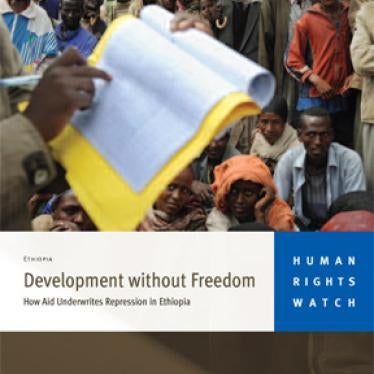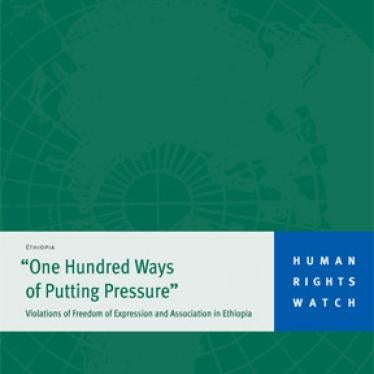Many western officials who manage international aid cite Ethiopia as an example of how assistance from donors like Canada can help African nations escape poverty. The reality is far more complicated - and far more cruel.
A recent Human Rights Watch report reveals that Ethiopia's repressive government has put foreign aid to a sinister purpose, with officials in Ethiopia's ruling party using their power to give or deny financial assistance to citizens based on their political affiliation. Perhaps even more shocking, international donors appear to expend more energy pretending these abuses don't exist than trying to address them.
The depth of the need of many poor Ethiopians is hard to dispute, and there is little doubt that the US$3 billion Ethiopia receives annually in donor assistance has brought help to the people of that country. In 2009 Ethiopia was selected as one of the Canadian International Development Agency's 20 preferred countries, and it has received more than 400 million CAD from Canada over the past few years. Many of the programs that receive donor assistance seek to tackle the harshest impacts of poverty head-on, through food-for-work programs or by providing much-needed resources like food, seeds and fertilizers to needy farmers.
There is nothing wrong with the goals of these programs. But donors have implemented them in ways that can only be described as indefensibly - and in some cases deliberately - naive.
In recent years, the Ethiopian government has carried out a meticulous campaign of intimidation, harassment and abuse that has managed to silence most of the government's independent opposition. Foreign aid has become one of the government's most effective tools in suppressing and punishing criticism. Human Rights Watch's research found that local officials often deny assistance to people they perceive as political opponents - including many who are not actually involved in politics at all. Impoverished farmers know they risk losing access to aid which their livelihoods depend on if they speak out against abuses in their communities. Most respond by staying quiet; aid discrimination has made freedom of speech a luxury many Ethiopians quite literally cannot afford.
Much of Canada's development aid funds a justice reform project in Ethiopia and it's a case in point. In the course of Human Rights Watch's investigation we met with several trainee judges who were suspended from their training and blacklisted from getting any public sector jobs after they raised concerns about the way in which the judicial training was used to indoctrinate students and coerce them into joining the ruling party. As one of the trainees put it, "Three times the trainers told us publicly to join the EPRDF [ruling party]. They want every judge to be a member of the party and they want you to do what they say, not what the law says."
Publicly, international donors argue that human rights cannot be shoved aside because rights and sustainable development are inextricably linked. But in Ethiopia this is only rhetoric. Donors have not just failed to stop their aid from being used as an instrument of repression, they haven't really tried. Some donor officials argue privately that Ethiopia should be allowed to pursue development without freedom - a position that is completely out of line with the principles their agencies use to justify their hefty budgets. Other donor officials say they worry that the Ethiopian government might not accept their assistance if they insist that it not be misused - an absurd argument that turns logic on its head.
Canada is one of Ethiopia's largest bilateral donors and Canadian officials should not continue sitting quietly by while Ethiopian government officials use foreign assistance to abuse poor Ethiopians.
Taxpayers cannot be asked to underwrite aid programs that are used as tools of repression.
CIDA has said it is "deeply concerned" by the Human Rights Watch report. If so, the right first steps are clear. Canada should be much more vocal in pushing to make sure aid is not used as a weapon to fight dissent, and programs that provide direct budget support to the Ethiopian government should be off the table altogether. All aid programs in Ethiopia should be independently monitored - a sensible measure that donors have no legitimate reason to resist.
Leslie Lefkow is senior Horn of Africa researcher for Human Rights Watch.







